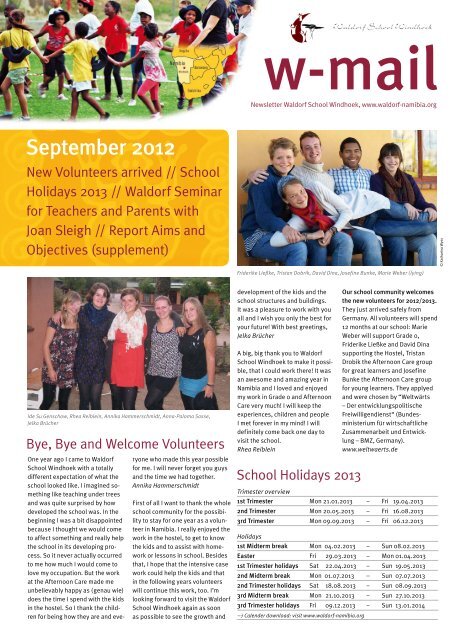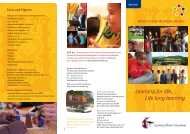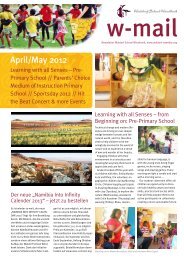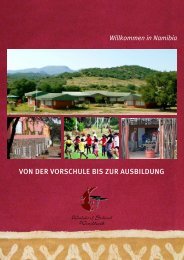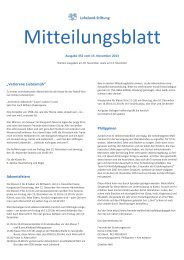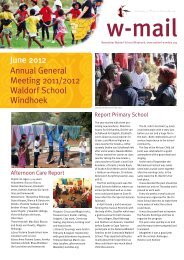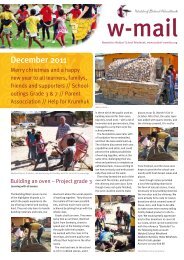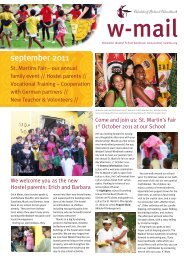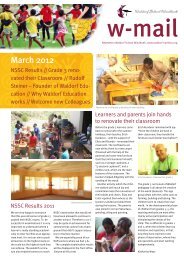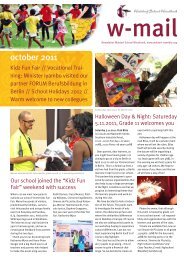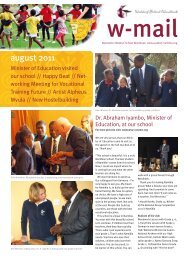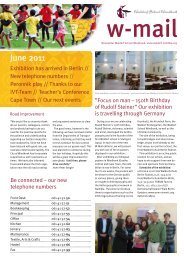September 2012 - Waldorf School Windhoek
September 2012 - Waldorf School Windhoek
September 2012 - Waldorf School Windhoek
Create successful ePaper yourself
Turn your PDF publications into a flip-book with our unique Google optimized e-Paper software.
w-mail<br />
Newsletter <strong>Waldorf</strong> <strong>School</strong> <strong>Windhoek</strong>, www.waldorf-namibia.org<br />
<strong>September</strong> <strong>2012</strong><br />
New Volunteers arrived // <strong>School</strong><br />
Holidays 2013 // <strong>Waldorf</strong> Seminar<br />
for Teachers and Parents with<br />
Joan Sleigh // Report Aims and<br />
Objectives (supplement)<br />
© Katharina Wyss<br />
Friderike Ließke, Tristan Dobrik, David Dina, Josefine Bunke, Marie Weber (lying)<br />
Ide Su Genschow, Rhea Reiblein, Annika Hammerschmidt, Anna-Paloma Sasse,<br />
Jelka Brücher<br />
Bye, Bye and Welcome Volunteers<br />
One year ago I came to <strong>Waldorf</strong><br />
<strong>School</strong> <strong>Windhoek</strong> with a totally<br />
different expectation of what the<br />
school looked like. I imagined something<br />
like teaching under trees<br />
and was quite surprised by how<br />
developed the school was. In the<br />
beginning I was a bit disappointed<br />
because I thought we would come<br />
to affect something and really help<br />
the school in its developing process.<br />
So it never actually occurred<br />
to me how much I would come to<br />
love my occupation. But the work<br />
at the Afternoon Care made me<br />
unbelievably happy as (genau wie)<br />
does the time I spend with the kids<br />
in the hostel. So I thank the children<br />
for being how they are and everyone<br />
who made this year possible<br />
for me. I will never forget you guys<br />
and the time we had together.<br />
Annika Hammerschmidt<br />
First of all I want to thank the whole<br />
school community for the possibility<br />
to stay for one year as a volunteer<br />
in Namibia. I really enjoyed the<br />
work in the hostel, to get to know<br />
the kids and to assist with homework<br />
or lessons in school. Besides<br />
that, I hope that the intensive case<br />
work could help the kids and that<br />
in the following years volunteers<br />
will continue this work, too. I’m<br />
looking forward to visit the <strong>Waldorf</strong><br />
<strong>School</strong> <strong>Windhoek</strong> again as soon<br />
as possible to see the growth and<br />
development of the kids and the<br />
school structures and buildings.<br />
It was a pleasure to work with you<br />
all and I wish you only the best for<br />
your future! With best greetings,<br />
Jelka Brücher<br />
A big, big thank you to <strong>Waldorf</strong><br />
<strong>School</strong> <strong>Windhoek</strong> to make it possible,<br />
that I could work there! It was<br />
an awesome and amazing year in<br />
Namibia and I loved and enjoyed<br />
my work in Grade 0 and Afternoon<br />
Care very much! I will keep the<br />
experiences, children and people<br />
I met forever in my mind! I will<br />
definitely come back one day to<br />
visit the school.<br />
Rhea Reiblein<br />
<strong>School</strong> Holidays 2013<br />
Our school community welcomes<br />
the new volunteers for <strong>2012</strong>/2013.<br />
They just arrived safely from<br />
Germany. All volunteers will spend<br />
12 months at our school: Marie<br />
Weber will support Grade 0,<br />
Friderike Ließke and David Dina<br />
supporting the Hostel, Tristan<br />
Drobik the Afternoon Care group<br />
for great learners and Josefine<br />
Bunke the Afternoon Care group<br />
for young learners. They applyed<br />
and were chosen by “Weltwärts<br />
– Der entwicklungspolitische<br />
Freiwilligendienst“ (Bundesministerium<br />
für wirtschaftliche<br />
Zusammenarbeit und Entwicklung<br />
– BMZ, Germany).<br />
www.weltwaerts.de<br />
Trimester overview<br />
1st Trimester Mon 21.01.2013 – Fri 19.04.2013<br />
2nd Trimester Mon 20.05.2013 – Fri 16.08.2013<br />
3rd Trimester Mon 09.09.2013 – Fri 06.12.2013<br />
Holidays<br />
1st Midterm break Mon 04.02.2013 – Sun 08.02.2013<br />
Easter Fri 29.03.2013 – Mon 01.04.2013<br />
1st Trimester holidays Sat 22.04.2013 – Sun 19.05.2013<br />
2nd Midterm break Mon 01.07.2013 – Sun 07.07.2013<br />
2nd Trimester holidays Sat 18.08.2013 – Sun 08.09.2013<br />
3rd Midterm break Mon 21.10.2013 – Sun 27.10.2013<br />
3rd Trimester holidays Fri 09.12.2013 – Sun 13.01.2014<br />
> Calender download: visit www.waldorf-namibia.org
<strong>Waldorf</strong> Seminar<br />
with Joan Sleigh<br />
for Parents and<br />
Teachers<br />
24–29 Sept <strong>2012</strong> Teachers Seminar<br />
28+29 Sept <strong>2012</strong> Parents Seminar<br />
We heartily welcome Joan Sleigh<br />
as a lecturer to give teachers<br />
and parents a <strong>Waldorf</strong> Enrichment<br />
Seminar at our school in <strong>September</strong><br />
<strong>2012</strong>.<br />
The Anthroposophical Society was founded by Rudolf<br />
Steiner in Switzerland in 1923. It seeks to support individuals<br />
who are working on their own inner development<br />
and who wish to bring the fruit of that inner work to<br />
benefit the wider world. www.anthroposophy.org<br />
© Anthroposophy Worldwide <strong>2012</strong>-07, written by Dr. Virginia Sease<br />
From South Africa to the Goethanum<br />
At the 2013 AGM the Executive Council at the Goetheanum will suggest Joan<br />
Sleigh as a new member. Joan Sleigh grew up in a Camphill community in<br />
South Africa with English as her first language. The mother of four studied<br />
<strong>Waldorf</strong> Education in Germany and has taught in schools as well as in<br />
teacher training.<br />
Especially since the opening of the borders to the Eastern European Countries<br />
in the early 1990s of the last century and due to the greater travel possibilities<br />
from people in Asia, most notably China, in recent years a mode of unilateral<br />
communication also has gained prominence. English serves today not only<br />
the English speaking nations but also figures as the mutual language for<br />
citizens of many countries when they step outside their national and ethnic<br />
boundaries.<br />
In this regard the Goetheanum and the Anthroposophical Society are not<br />
exceptions, as we have mentioned recently in No 4/<strong>2012</strong> of Anthroposophy<br />
Worldwide in connection with study possibilities at the Goetheanum. We<br />
welcome the fact, however, that many students who speak English as their<br />
first or second language choose to learn German in order to gain access to<br />
Rudolf Steiner through the original language.<br />
Growing up speaking English<br />
Some time ago the Executive Council members decided to seek for a person<br />
to join us in our work for the General Anthroposophical Society who, like<br />
Virginia Sease, comes originally from an English speaking country, has<br />
English as her or his mother-tongue and with a corresponding education.<br />
Of course, in addition to a strong background in and dedication to Anthroposophy,<br />
an important requirement is that this person also be fluent in spoken<br />
and written German. Age also plays a role in such a search.<br />
We are delighted to announce to the membership worldwide that we have<br />
found a person who we feel meets all of these requirements and has many<br />
other significant attributes as well. After a time of comprehensive consideration<br />
Joan Sleigh of Cape Town, South Africa, has agreed to join us in our<br />
work in the Executive Council and in the Collegium of the <strong>School</strong> of Spiritual<br />
Science. She has met not only with the members of the Executive Council but<br />
also with the Section Leaders. The positive affirmation of her in both these<br />
circles was unanimous. In November the General Secretaries will have an<br />
opportunity to meet her. During the Annual General Meeting in the spring of<br />
2013, the Executive Council at the Goetheanum wants to ask the members to<br />
confirm Joan Sleigh as a new member of the Executive Council.<br />
Childhood in Camphill Hermanus<br />
Joan Sleigh was born in 1962 to parents living and working in Camphill<br />
Hermanus, South Africa. She describes her childhood as happy also because<br />
she had four siblings. Those who are familiar with Camphill Hermanus will<br />
appreciate that brothers and sisters are important as it lies in a rather isolated<br />
protected surrounding in a bay area east of Cape Town. When her parents<br />
pioneered a new Camphill, Alpha, the family moved. Her father, Julian<br />
Sleigh, a priest of the Christian Community, also built a chapel on the site<br />
and her mother, Renate Sleigh, a nurse, took care of medical situations and<br />
carried the cultural life such as festivals. When Joan was three years old<br />
her family spent one year at Camphill Botton Village (UK). During this time<br />
she met her maternal grandfather, Karl König, although she was so young<br />
that she has little recollection of the meeting.<br />
Joan Sleigh had the advantage of a <strong>Waldorf</strong> <strong>School</strong> but she also then<br />
attended an Afrikaans farm school close to Camphill Alpha. This led to a<br />
proficiency in Afrikaans.<br />
Her life in South Africa experienced a pause between 1982 and 1995<br />
as she married and moved to Bochum (DE). During these years she was<br />
a devoted mother to her four children. Also along the way she attended<br />
<strong>Waldorf</strong> Teacher Training in Witten-Annen. Afterwards she taught English<br />
and handwork at the Widar Schule Wattenscheid for three years.<br />
Working as a class teacher<br />
When she then returned with her four children to Cape Town in 1995 she<br />
was asked to become a class teacher at Michael Oak <strong>Waldorf</strong> <strong>School</strong>. As<br />
of this time she has completed two full cycles and one half cycle as a Class<br />
teacher. In December <strong>2012</strong> her current class will complete the 7th grade<br />
which marks the end of the class teacher time in South Africa.<br />
In 2007 she also began lecturing at the Centre for Creative Education,<br />
the <strong>Waldorf</strong> Teacher Training program in Cape Town, which she still does<br />
at this time. At present she is completing her Master’s degree with a focus<br />
on leadership connected with adult education. Joan Sleigh recently began<br />
to represent South Africa in the Hague Circle, an international group which<br />
works in conjunction with the Pedagogical Section of the <strong>School</strong> of Spiritual<br />
Science. In addition, she has strong personal connections with Europe<br />
as three of her adult children and two grandchildren live in Germany. At the<br />
moment only one daughter resides in Cape Town.<br />
Whenever someone is called to the Goetheanum to serve in the Executive<br />
Council or as a Section Leader, many tasks which that person has carried<br />
suddenly must be taken on by someone else. This represents a sacrifice<br />
on the part of the Anthroposophical Society in that country and for any<br />
anthroposophical institution with which the person was connected –<br />
usually in a sphere of high responsibility. The person’s connection with<br />
the work in the “home country” remains a vital part of the new tasks which<br />
need to be addressed and worked upon; however the horizon widens<br />
considerably as the responsibilities encompass a far greater whole.<br />
Making sacrifices<br />
We look to the members in South Africa with gratitude for their gracious<br />
willingness to accept the situation that one of their very active members<br />
will not be present on a daily basis, however she will surely continue her<br />
work in a vital – if metamorphosed – form at the Goetheanum. In conclusion<br />
to this brief introduction of Joan Sleigh I would like to add a personal<br />
note of gratitude that aspects of the work which have developed over the<br />
years will continue to receive attention and that I will be in a position to<br />
actively accompany this fine new colleague for some time if the membership<br />
affirms her appointment at the Annual General Meeting in March 2013.
Biodynamic Agriculture<br />
Biologisch-dynamische Landwirtschaft<br />
During the 1920’s, some<br />
farmers, landowners and<br />
food producers, who identified<br />
with Rudolf Steiner’s<br />
anthroposophical ideas,<br />
were looking for a new approach<br />
to agriculture. They<br />
found that their daily food did<br />
not taste as good as it did in their<br />
childhood. They noticed a decline in<br />
the nutritional vitality/quality of cereals<br />
and other crops, and so they were<br />
hoping for a new impulse in agriculture.<br />
Rudolf Steiner laid the foundations of bio-dynamic<br />
agriculture, which is being applied worldwide today,<br />
in a series of lectures held in Koberwitz in 1924.<br />
In den 1920er Jahren trugen einige Landwirte, Gutsbesitzer<br />
und Lebensmittelverarbeiter, die der Anthroposophie<br />
nahe standen, Rudolf Steiner das Anliegen vor, von ihm<br />
Anregungen zu einer Neuorientierung des Landbaus zu<br />
erhalten. Sie fanden, dass die Nahrungsmittel, mit denen<br />
sie täglich zu tun hatten, weniger gut schmeckten als die,<br />
die sie noch in der Kindheit genossen hatten. Beim Getreide<br />
und anderen Kulturen sei ein Nachlassen der Vitalität/<br />
Qualität zu bemerken. So bekam zunächst ein kleiner Kreis<br />
• no use of synthetic fertilizers and chemical pesticides<br />
• home-produced, potentised preparations made from dung,<br />
medicinal plants and minerals, which have a vitalising and<br />
healing effect on the earth organism<br />
von Freunden der Anthroposophie neue Impulse für den<br />
Landbau. 1924 legte Rudolf Steiner in der Vortragsreihe<br />
„Geisteswissenschaftliche Grundlagen zum gedeihen der<br />
Landwirtschaft“ in Koberwitz den Grundstein der biologischdynamischen<br />
Landwirtschaft, die heute weltweit Anwendung<br />
findet.<br />
Biodynamic agriculture means:<br />
• sustainable agriculture<br />
• growth of humus layer<br />
• highest quality standards of food production worldwide<br />
• complete cycle of production<br />
Biologisch-dynamisch heißt:<br />
• Nachhaltigkeit der Landwirtschaft<br />
• Wachstum der Humusschicht<br />
• Höchste Qualität in der Lebensmittelerzeugung weltweit<br />
• geschlossener Betriebskreislauf<br />
• Verzicht auf synthetische Dünger und chemische<br />
Pflanzenschutzmittel<br />
• selbst hergestellte feinstoffliche Präperate aus Mist,<br />
Heilpflanzen und Mineralien wirken vitalisierend und<br />
heilend auf den Erdorganismus<br />
NAMIBIA:<br />
Krumhuk Farm (bio-dynamic)<br />
25 km south of <strong>Windhoek</strong>, 8450 ha, Cattle<br />
ranch, fodder production, milk products,<br />
butchery, Guesthouses, more than<br />
20 co-workers, ca. 80 inhabitants. Product<br />
sale: Green Market; private customers.<br />
Tel. +264-81-23 40 85<br />
Photos: Krumhuk Farm · Design: Katharina Wyss<br />
Poster 7, Travel Exhibition “Focus on Man – Rudolf Steiner and Anthroposophy in Namibia“, more information about Krumhuk Farm > www.krumhuk.de and www.atckrumhuk.org
Zelwa Klein<br />
Sadly we had to say good-bye to Zelwa at the<br />
end of August. She has done a fantastic job in<br />
updating and running the bookkeeping office<br />
for the past two years. We are very grateful for<br />
her diligent and professional approach to her<br />
work and clients. We wish her everything of the<br />
best for her future endeavours.<br />
We welcome Gemma Pieters who has taken<br />
over the bookkeeping from Zelwa at the beginning<br />
of <strong>September</strong>. Kathi Damon<br />
Gemma Pieters<br />
Events <strong>September</strong> <strong>2012</strong><br />
Parents Evening Grade 12<br />
Mon 10 <strong>September</strong> <strong>2012</strong>, 19:00<br />
Parent Association (PA)<br />
Wed 12 <strong>September</strong> <strong>2012</strong>, 19:00<br />
Cinema “Rudolf Steiner“ Part 2<br />
Tue 17 <strong>September</strong> <strong>2012</strong>, 18:00<br />
Grade 12 Year Projects<br />
Fri/Sat 21/22 <strong>September</strong> <strong>2012</strong><br />
Green Market Café<br />
Sat 22 <strong>September</strong> <strong>2012</strong>, Grade 11<br />
Public Lecture on Michaelmas<br />
Mon 24 <strong>September</strong> <strong>2012</strong>, 19:00<br />
<strong>Waldorf</strong> Seminar for Teachers<br />
24–29 <strong>September</strong> <strong>2012</strong><br />
Readathon<br />
Thu 27 <strong>September</strong> <strong>2012</strong><br />
Michaelmas<br />
Fri 28 <strong>September</strong> <strong>2012</strong><br />
<strong>Waldorf</strong> Seminar for Parents<br />
28–29 <strong>September</strong> <strong>2012</strong><br />
Midterm break<br />
20–28 October <strong>2012</strong><br />
© Katharina Wyss<br />
© Katharina Wyss<br />
Norman Skillen<br />
We are happy to have Norman back here to<br />
teach back to teach an English main lesson<br />
called The Word in grade 10 for the first three<br />
weeks of the trimester. He will also join Joan<br />
Sleigh, an experienced <strong>Waldorf</strong> class teacher in<br />
running a Teachers’ Enrichment seminar from<br />
24–29 <strong>September</strong>, a Parents’ seminar on 28th<br />
and 29th <strong>September</strong>. More details will follow<br />
shortly about this. Kathi Damon<br />
Cinema Evening, Part 2<br />
Tue, 17 <strong>September</strong><br />
<strong>2012</strong>, 18h00: “The<br />
Challenge of Rudolf<br />
Steiner” Part 2<br />
(1h45min), a documentary<br />
film by Jonathan<br />
Stedall. We welcome<br />
you to our 2nd evening<br />
Cinema at our <strong>School</strong>.<br />
Entrance free. Once a<br />
month we will show movies and documentaries.<br />
We decided to show part 1 again and will inform<br />
you in time.<br />
Cinema Evening, Part 2<br />
Tuesday, 17 <strong>September</strong> <strong>2012</strong>, 18:00: “The<br />
Challenge of Rudolf<br />
Steiner” Part 2 (1h45min), a documentary film<br />
by Jonathan Stedall. We welcome you to our<br />
2nd evening Cinema at our <strong>School</strong>. Entrance<br />
free. Once a month we will show movies and documentaries.<br />
We decided to show part 1 again<br />
and will inform you in time.<br />
Kidz Fun Fair <strong>2012</strong><br />
This year we were the only school represented<br />
at the Kidz Fun Fair. On the whole the event did<br />
not draw such a crowd as last year, but that<br />
didn’t prevent interested parents finding their<br />
way to our stand. Most of our team of teachers<br />
did alternate shifts on the stand. Many thanks<br />
to everyone for their contributions.<br />
Katharina Wyss<br />
Contact to our W-Mail-Team: Katharina Wyss<br />
wyss@milch-berlin.de, Cell +264 (0)81 340 23 79<br />
© Katharina Wyss<br />
The <strong>Waldorf</strong> Soccer Team<br />
Some of the hostel children went to Pioniers<br />
Park to surprise the <strong>Waldorf</strong> Soccer Team at<br />
their first public soccer match on the 10th of<br />
August. They played vital, strong and well<br />
organized, motivated and encouraged by their<br />
trainer and coach Ihapa Nguvauva. That very<br />
day they were the happy winners. The team<br />
commits on Tuesdays and Wednesdays for a two<br />
hour training session. We hope they will continue<br />
there hard work during following Trimester<br />
and wish good luck! Barbara Stauffer<br />
Reports from Aims and<br />
Objectives Group Work<br />
On the 4th of April parents and teachers met<br />
for the first time to start a process of working<br />
together on our school‘s future > continue<br />
reading in our supplement<br />
Keep in Contact:<br />
<strong>Waldorf</strong> <strong>School</strong> <strong>Windhoek</strong><br />
P.O. Box 90326, <strong>Windhoek</strong>, Namibia<br />
Andries de Wet Street/Avis<br />
Tel. +264 (0)61 41 52-50, Fax +264 (0)61 41 52-99<br />
office@waldorf-namibia.org<br />
Web: www.waldorf-namibia.org<br />
Blog: www.wsw-connect.org<br />
Namibia<br />
<strong>Waldorf</strong> <strong>School</strong> <strong>Windhoek</strong><br />
Nedbank Namibia, Hidas <strong>Windhoek</strong><br />
Branch-Code 461696, Account: 110 000 826 88<br />
IBAN: 46 16 96 11 00 00 82 688<br />
BIC (Swift-Code): NEDS NANX<br />
Germany<br />
Freunde der Erziehungskunst, GLS Bank<br />
Account: 130 420 10, BLZ 430 609 67<br />
VWZ: 4886 WSW Namibia + Spenderadresse<br />
Die Angabe Ihrer Anschrift im Feld Verwendungszweck ermöglicht<br />
das Ausstellen der Spendenbescheinigung.<br />
Switzerland<br />
Freie Gemeinschaftsbank BCL<br />
Account: EK 115.5<br />
Postcheck der Bank: Basel 40-963-0<br />
Kennwort: WSW Namibia<br />
Netherlands<br />
Triodos Bank NV, Zeist, Account: 21.22.68.872<br />
Kennwort: WSW Namibia


